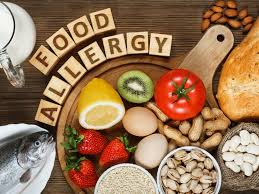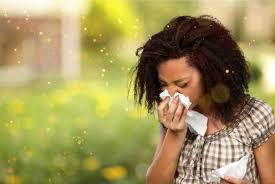Allergy, Asthma and Immunology — Conditions We Treat
Allergic Rhinitis or Hayfever
Allergic rhinitis (AR) is an allergic reaction to inhaled substances. There are two main types: seasonal ( at certain times of the year) allergic rhinitis and perennial ( year round) allergic rhinitis.
Symptoms may include runny nose, sneezing, itchy eyes, itchy throat and hoarseness. AR can affect young children to adults.
Asthma
Asthma is a chronic inflammation of the airways in your lungs. Symptoms can include wheezing when breathing, a dry cough at rest or with activity, a feeling of not being able to take a full breath, or being able to "catch your breath". Asthma can effect infants to adults.
Eczema or Atopic Dermatitis
Eczema, also known as Atopic dermatitis, is a condition where patches of skin become inflamed, itchy, red, cracked, and rough. This skin condition can effect all ages from infants to the elderly.
Immune Disorders
Immune system disorders cause abnormally low activity or over activity of the immune system.
In cases of immune system over activity, the body attacks and damages its own tissues causing autoimmune diseases such as Lupus, Rheumatoid arthritis and Multiple sclerosis.
Immune deficiency diseases decrease the body's ability to fight invaders, causing vulnerability to infections.
There are several classes of immunoglobulins, such as immunoglobulin A (IgA), IgD, IgE, IgG, and IgM. Each class helps protect the body from infection in a different way. Immune disorders can occur across the lifespan.
Contact Dermatitis
Contact dermatitis is irritation or reaction from something that touches your skin, causing it to become red, sore, itchy or swollen. Common causes can include soaps, cosmetics, fragrances, jewelry and plants.
Food Allergy/ Food Sensitivity
With food allergies, the body's immune system reacts to food as if it were a harmful substance, releasing chemicals that can cause hives, shortness of breath, tongue swelling and other symptoms.
Food sensitivities usually result from the digestive system’s reaction to enzymes or proteins in food. They are sometimes mistaken for food allergies.
Hives (Urticaria)
Urticaria, also known as hives, is an outbreak of swollen, pale red bumps or plaques (wheals) on the skin that appear suddenly -- either as a result of the body's reaction to certain allergens, or for unknown reasons. Hives usually cause itching, but may also burn or sting.
Sinusitis
Sinusitis is an inflammation or swelling of the tissue lining the sinuses. It can be acute or chronic, and it can be caused by viruses, bacteria, fungi, allergies, or even an autoimmune reaction. Sinusitis typically occurs in adults.
Angioedema
Angioedema is swelling under the skin, rather than on the skin as is the case with hives. Angioedema swelling typically occurs around the eyes and lips and can occur alone or with other symptoms of allergies
Allergic Rhinitis or Hayfever
Allergic rhinitis (AR) is an allergic reaction to inhaled substances. There are two main types: seasonal ( at certain times of the year) allergic rhinitis and perennial ( year round) allergic rhinitis.
Symptoms may include runny nose, sneezing, itchy eyes, itchy throat and hoarseness. AR can affect young children to adults.
Asthma
Asthma is a chronic inflammation of the airways in your lungs. Symptoms can include wheezing when breathing, a dry cough at rest or with activity, a feeling of not being able to take a full breath, or being able to "catch your breath". Asthma can effect infants to adults.
Eczema or Atopic Dermatitis
Eczema, also known as Atopic dermatitis, is a condition where patches of skin become inflamed, itchy, red, cracked, and rough. This skin condition can effect all ages from infants to the elderly.
Immune Disorders
Immune system disorders cause abnormally low activity or over activity of the immune system.
In cases of immune system over activity, the body attacks and damages its own tissues causing autoimmune diseases such as Lupus, Rheumatoid arthritis and Multiple sclerosis.
Immune deficiency diseases decrease the body's ability to fight invaders, causing vulnerability to infections.
There are several classes of immunoglobulins, such as immunoglobulin A (IgA), IgD, IgE, IgG, and IgM. Each class helps protect the body from infection in a different way. Immune disorders can occur across the lifespan.
Contact Dermatitis
Contact dermatitis is irritation or reaction from something that touches your skin, causing it to become red, sore, itchy or swollen. Common causes can include soaps, cosmetics, fragrances, jewelry and plants.
Food Allergy/ Food Sensitivity
With food allergies, the body's immune system reacts to food as if it were a harmful substance, releasing chemicals that can cause hives, shortness of breath, tongue swelling and other symptoms.
Food sensitivities usually result from the digestive system’s reaction to enzymes or proteins in food. They are sometimes mistaken for food allergies.
Hives (Urticaria)
Urticaria, also known as hives, is an outbreak of swollen, pale red bumps or plaques (wheals) on the skin that appear suddenly -- either as a result of the body's reaction to certain allergens, or for unknown reasons. Hives usually cause itching, but may also burn or sting.
Sinusitis
Sinusitis is an inflammation or swelling of the tissue lining the sinuses. It can be acute or chronic, and it can be caused by viruses, bacteria, fungi, allergies, or even an autoimmune reaction. Sinusitis typically occurs in adults.
Angioedema
Angioedema is swelling under the skin, rather than on the skin as is the case with hives. Angioedema swelling typically occurs around the eyes and lips and can occur alone or with other symptoms of allergies



